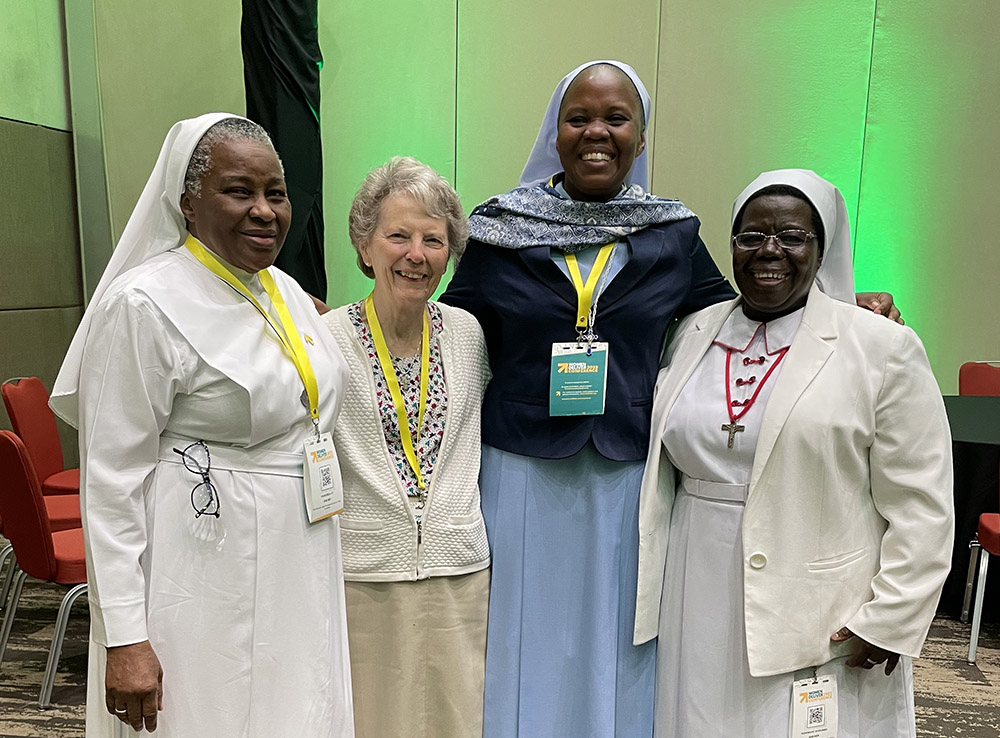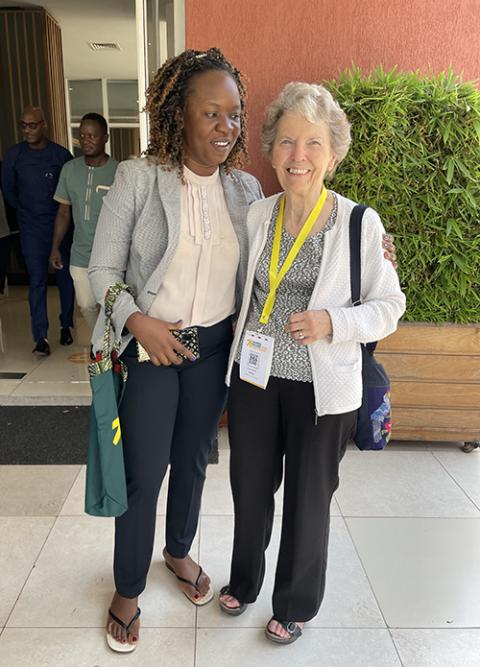
Presentation Sr. Joyce Meyer (second from left), international liaison for Global Sisters Report, meets with, from left, Sr. Francisca Ngozi Uti, Handmaids of the Holy Child Jesus in Nigeria; Sr. Hedwig Muse, Little Sisters of Mary Immaculate in Kenya; and Sr. Rosemary Nyirumbe, Sisters of the Sacred Heart of Jesus in Uganda, during the Women Deliver 2023 Conference held July 17-20 in Rwanda. (GSR photo)
I was mesmerized by color this past July attending the sixth Women Deliver Conference in Kigali, Rwanda. Nature and people celebrated Africa as one of the most colorful places in the world. Color flourished in nature's trees, flowers and people. Women's and men's clothing pick up these vibrant colors of nature and celebrate them at every turn.
Rwanda's red soil was the perfect background for spectacularly green foliage and diversity of nature's beauty. It also provided a landscape for the colors of Asia and the South Pacific and other continents of our world represented at the conference.
For me, the theme of color was prevalent, not only physically but spiritually. There were spaces for prayer for participants witnessing their faith.
Before going to the conference, I did not know much about the organization except what I read on its website. It grew in my appreciation as I attended sessions focusing on women's roles in every issue of our world.

GSR African correspondent Doreen Ajiambo, left, and Presentation Sr. Joyce Meyer attend the Women Deliver 2023 Conference held July 17-20 in Rwanda. (GSR photo)
What first drew me to attend was that it was the first time in its history that Catholic sisters would be participating, at least that we knew of. My colleague Doreen Ajiambo, Global Sisters Report African correspondent, has already written that important and groundbreaking story.
I felt very proud to be a sister in attendance as these 10 women from several countries in Africa alerted the women gathered about the ministry and faith roles of sisters in the world and our desire to work with other women to make the world a better place.
Some years after its founding, the organization recognized the need to give space to issues specific to girls, often overlooked even though they are women. In 2007, Women Deliver began to focus on women's health, particularly reproductive and maternal issues often marginalized worldwide and even criminalized in some places. The conference's name reflects these issues but also of women's power to "deliver" what needs to be done in our world.
Today, the organization describes its purpose as advocate for the rights of girls and women for gender equality and health in societies around the world.
More than 6,000 women, girls and a few men attended the conference with several thousand online, the second-largest Women Deliver gathering ever hosted.
It was the first time the conference was held in an African country and the Rwandans did themselves proud. I do not know how they were able to feed 6,000 people a hot meal at noon each day. There was fish, meat, potatoes, rice, many vegetables, breads and desserts. It was an amazing experience. The organizational skills required were met without a glitch.
Conference themes included "Spaces, Solidarity and Solutions" frames for all of the presentations and panels. There were only a few times when the 6,000 were gathered in one space and that was the opening and the closing. All other presentations were in a conference center auditorium and smaller forum settings. One disappointment was that by the time my friends and I would reach a forum we wanted to hear, the place was already full, without capacity for overflow.
The "Spaces" theme brought awareness of efforts needed from all of us women to seek out spaces where issues important to us can be addressed and also to enthusiastically support and help one another to find those spaces and use them. We were encouraged never to give up on energies of perseverance and commitment for this expansion.
It was also a call at times to open ourselves to new interior spaces of consciousness for inclusion of others, letting go of biases and stereotypes.
"Solidarity" reminded us that there are so many issues that women and girls face, but these issues are not just ours, they impact everyone around us. We cannot allow ourselves or others to be marginalized by the language. "Women's issues" belong to the whole of humanity. We are all interconnected. No one can be invisible.
I was inspired to see the men who also attended. I learned of an organization called Men Care, initiated by PanAfricare, an nongovernmental organization out of Zimbabwe dedicated to male empowerment.
Men Care educates men to be caregivers in home-based care. It was inspired by one man who began to question why his wife should be the sole caregiver for his brother who had HIV/AIDs. He decided to go through training and encouraged other men to do the same.
It takes courage at times to go against the cultural norms that inhibit such service. Other men were there to learn how they can also become advocates for the goals of the conference.
We also heard about diverse solutions to the issues and learned that enduring solutions need to respond to particular situations. Our task is to encourage one another to that creativity, and support such efforts. Sharing solutions with others can spark the flame of creativity within each of us and at times help us "reframe" our own situations.
I also had the opportunity to participate in two events outside the conference. One was a memorial service in a cemetery under the blazing sun for a recently deceased mother of a friend.
Advertisement
It, too, was a colorful event with relatives dressed in beautiful gowns celebrating with songs and prayers the life of a woman who had lost three sons in the genocide and had personally survived a shooting attack on her own home. The celebration of her life continued throughout the day for relatives and neighbors to eat, remember, sing and pray together.
I also met with Sr. Immaculée Uwamariya, founder of Famille Esperance (Hope for Families). She was inspired to help families learn to live in harmony, strengthen the vocation of marriage and spread God's love in the world. It complements Rwanda's policy that places the family at the center of the country's development.
Famille Esperance, founded in 2012, is especially amazing because both administration and sustainability is maintained only by volunteers. Sister Immaculée brought some of her co-workers and board with her to tell us the story of their vision and commitment to this mission. For all of these years, there have been no paid employees, even the executive director. Immaculée is the principal of a school of the Bernadine congregation to which she belongs.
These five days also brought back memories of two other visits I had to Rwanda when I was director of the Hilton Fund for Sisters. I came away from my latest visit filled with joy, surprise and an energy to keep alive the spirit of persistence and endurance I experienced.







